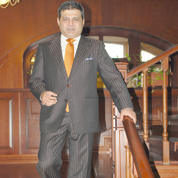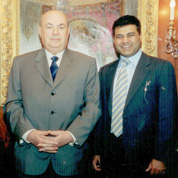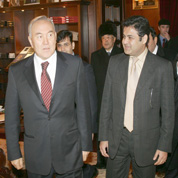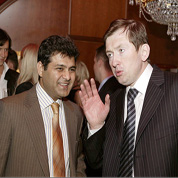The new corporate face of the Indian businesses in Russia

Sammy Kotwani — the owner of The Imperial Tailoring Co., the famed maker of bespoke suits and shirts in Russia and other CIS states — was recently elected the president of the Indian Business Alliance (IBA), the umbrella organization for all Indian corporations in Russia, with a promise to make the alliance more prominent in Russia’s corporate life. In this long-range interview, Kotwani talked about the enormous business opportunities offered by the currently robust Indian-Russian relations, the IBA’s new objectives and other issues affecting foreign investors in Russia.
As the new IBA president and a veteran business executive in Russia, how would you assess the current level of cooperation between Russian and Indian companies?
Today, the trade turnover between India and Russia is very low, at about $3.5bln, most of which comes from the defense-related industries. Various programs are being taken by both governments to raise the turnover to a level commensurate with the scale of the current robust cooperation between our countries. One of these is the target set by the Indian-Russian Group, which envisages raising the trade turnover to $10bln by 2010. But, in order to achieve this goal, more proactive work needs to be done, both by the governments and the business circles. This is where the IBA comes in. Specifically, I would like the IBA to become a platform that can be used by members to springboard their businesses toward more rapid growth.
"Specifically, our ultimate goal is to make the IBA a platform that can be used by its members to springboard their businesses toward more rapid growth in Russia."
This means transforming the alliance into a strong, professional organization capable of supporting its members and their businesses in Russia. To this end, we need to identify the key industries, which have potential and then garner support from both the Indian and Russian governments and corporations in both countries to translate this potential into reality. Some of these areas include the pharmaceutical, IT and tea industries, etc, where India is currently one of the key players on the Russian market.
What are your plans for the IBA and how do you see its place and role in today’s Russia?
Today’s Russia is full of business opportunities, making it the time for Indian investors to come and do business here. The main reasons that currently discourage  Indian investors are the language problems and lack of knowledge of the local legislation. Therefore, the IBA’s role is to act as an intermediary that will promote businesses between India and Russia. Also, we will proactively look at the various business opportunities and make suggestions to members. Another important thing is to establish productive networking among members and use my numerous high-profile ties to connect Indian and Russian businesses together through the IBA. I also plan to raise the reputation of the IBA, currently a low-profile organization, through creating positive media awareness about its activities. For instance, since election, I have given several interviews to different media, all aimed at making the IBA an easily recognizable name in Russia. This is not only to enable people to simply know about its existence, but also its capabilities as a strong business lobbyist organization.
Indian investors are the language problems and lack of knowledge of the local legislation. Therefore, the IBA’s role is to act as an intermediary that will promote businesses between India and Russia. Also, we will proactively look at the various business opportunities and make suggestions to members. Another important thing is to establish productive networking among members and use my numerous high-profile ties to connect Indian and Russian businesses together through the IBA. I also plan to raise the reputation of the IBA, currently a low-profile organization, through creating positive media awareness about its activities. For instance, since election, I have given several interviews to different media, all aimed at making the IBA an easily recognizable name in Russia. This is not only to enable people to simply know about its existence, but also its capabilities as a strong business lobbyist organization.
How do you plan to translate all these lofty plans into reality?
The IBA now has a good team and professional management. This is one of the most important things. Second, the IBA members have understood the urgent need for a change. Third – the current bilateral relations between India and Russia are at their historical best, and it needs to be stressed here that today’s India is no longer a weak partner, evident from its robust economy, highly educated labor force, robust market and memberships in various international associations, including the BRIC group. Fourth – my personal connections with the right people in and outside Russia. For instance, several ministers, legislators and other top Russian government officials are my clients. Harnessing all these and other positive factors will enable the new IBA team to achieve all its stated goals.
Do you think these measures will enable the IBA to be on par with the other more influential foreign business associations, which are actively lobbying their interests in Russia?
As mentioned before, the objective now is to make the IBA much more influential, and the thrust will be on making the alliance more proactive, which will catalyze more business growth for its members. To achieve this, the new IBA administration will interact more actively with all the members, not only just to understand their needs/expectations, but also to map out realistically achievable strategies that will enable it to meet such expectations. We also need to involve the big business houses back in India, most of which have yet to come to Russia. This means creating a forum that will enable them to get more information on the investment opportunities and make them much more interested in Russia as a potentially prospective market for their goods and services.
"The new IBA administration will interact more actively with all the members, not only just to understand their needs/expectations, but also to map out realistically achievable strategies that will enable it to meet such expectations."
Similarly, establishing mutually beneficial partnerships with other Indian business associations in such places as Dubai, Singapore, the United Kingdom, etc, will also help raise the IBA to a new level of positive corporate lobbyism in Russia. And, finally, I need to note that I have a really professional team, christened “the IBA Dream Team,” which is very supportive and enthusiastic, and this gives me the confidence that all the stated targets will be achieved during my presidency.
Are there any practices/policies that you see as retrogressive during the previous IBA administrations and, therefore, would like to discard off, as you set out to reform the alliance?
 I don’t really want to comment on how the IBA was run before I became the president because this is not forward looking. Besides, the elections are now over, and so are all the issues that had existed prior to, and/or during, the election. Of course, the new management will definitely learn from the past, note the pitfalls and what was lacking and make all the necessary adjustments in policies, but only as a means to formulating new strategies to achieve our new objectives. One of what was lacking, as I have already noted, was active lobbying, and we intend to intensify this, because to do lucrative business in this country we need to interact more closely with the Russians.
I don’t really want to comment on how the IBA was run before I became the president because this is not forward looking. Besides, the elections are now over, and so are all the issues that had existed prior to, and/or during, the election. Of course, the new management will definitely learn from the past, note the pitfalls and what was lacking and make all the necessary adjustments in policies, but only as a means to formulating new strategies to achieve our new objectives. One of what was lacking, as I have already noted, was active lobbying, and we intend to intensify this, because to do lucrative business in this country we need to interact more closely with the Russians.
You are one of the most successful Indian entrepreneurs in Russia. How did you achieve this, given the traditional typical Russian problems faced by most foreign investors in this country?
I was lucky to understand the nitty-gritty of doing business in Russia, as soon as I arrived here almost 20 years. But looking back today, I feel that some of the problems I had in the beginning were due mainly to the language barrier and lack of understanding of the local laws. Once a foreign investor understands these things, life becomes a lot easier, and he/she can go about his/her major business without encountering unnecessary hurdles. This why we will try to solve all such problematic issues via the IBA to prevent them from becoming deterrent to starting new or expanding the existing Indian businesses in Russia.
What, both as a CEO and IBA president, do you see as the biggest growth limiting factors on the Russian market, and what should be done to eliminate them or minimize their impacts?
Here, government officials still treat foreign owners of companies as just ordinary people, though being strategic investors; they really deserve some preferential treatments. This in contrast to the situations in most other countries, where long-term strategic foreign investors are provided with huge official support, including long-term, multiple-year visas. But in Russia, there is no such support, and the longest visa obtainable is a one-year visa, with rigorous extension requirements. All these are not conducive to businesses. Besides, frequent amendments to the business legislation and other laws, rising incidences of corporate raiding, etc, are also increasing the level of potential risks faced by foreign investors with multimillion-dollar assets in Russia. This raises a lot of concerns, especially as most foreign investors have no guaranties, and therefore, could lose their investments or face other serious problems, including visa issues in the case of disagreements with the government and/or with their influential Russian business partners. So, our task is also to let the Russian government know about this. 
One of your top priorities is to solve the Indian School issue as quickly as possible. How really acute is this problem and what are the concrete steps being taken to solve it?
The Indian school issue is one of the biggest problems on the IBA’s agenda, especially as its solution is not completely in our hands. For instance, the rents on real estate have been become excessively high. The problem of children’s education is really serious, because to put children in other private primary schools and pay huge amounts is not the best option, though some IBA members can afford these exorbitant costs. Besides, this also means that Indian companies sending employees to Russia will have to make additional budgets for these expenditures, thus increasing their overhead costs. Another problem is our culture, which makes every parent abroad to send their children only to Indian schools, because this way, the link to our culture is maintained. One of the solutions is to expand the only Indian Embassy School in Moscow to accommodate more pupils. To this end, we have approached the Moscow Government to give the school more floors in the same building. Another probable solution might be to introduce the morning and afternoon shifts, again to increase admissions, though this will pose serious transportation problems for parents with children in different shifts. And, finally, we are looking for other premises to set up more schools to provide adequate admission opportunities for all Indian children in Russia.
Finally, how do you plan to share your time between the IBA and your company, given the fact that both will now require much of your time for their effective management?
I am aware that I will have to give much time to both. But one needs to understand that I’m not doing everything alone. For instance, the IBA executive team is made of 16 officials, each with his sphere of responsibilities. Besides, I’ve several supporting hands, and when things need to be done, I can contact the right persons, including outside the IBA, because I have lots of good connections in Russia, thanks to my almost 20 years of experience in this country. Of course, as the president, I provide the strategic leadership, formulate the IBA’s priority policies, etc. But for my private business, the management and the day-to-day running are already well established and functioning as required. All I need to do here is only to review its progress periodically. So, I am sure I will able to manage my time efficiently between the two organizations.












 Web design,
Web design,